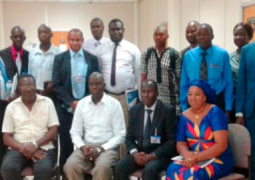In his recently issued press release Tsidi M.
Tsikata,Mission Chief for The Gambia with the International Monetary Fund, has
laid out very clearly the state of our economic affairs in The Gambia. By
reaching the "completion point" under the Heavily Indebted Poor Countries (
The release states, "In recent years, the Gambian economy has begun to reap the benefits from sound macroeconomic policies. Since 2004, the restoration of fiscal and monetary discipline has stabilised the exchange rate and brought inflation back to low single-digit levels." It continues to say, "Economic growth picked up, and has averaged almost 6 1/2% a year over the past four years, one of the highest growth rates in the region."
These are both positive statements but the fact is that an estimated 60% of our people are living below the poverty line. Economic activity such as that cited above are very welcome developments, but who are they benefiting most? If six out of every ten people in the country are living in poverty it means that the money is in the hands of the other four out of that ten.
As more money floods into the country through the various foreign investments cited by Mr. Tsikata, such as tourism, construction and telecommunications sectors, the cost of living will inevitably rise. This will be an uncomfortable but manageable situation for those who have money but it may doom those who do not. The poorest people in this nation are already facing the specter of rising food prices. If this gap between rich and poor continues to grow as it is at the moment then we could see a situation where people are dying of hunger. Unfortunately the new money in the country does not seem to be "trickling down" as general capitalist theory says it will. In The Gambia the rich are getting richer and the poor are getting poorer.
What government must now do is laid out extremely succinctly by Mr. Tsikata in his press release. He says, "Debt relief and other assistance from The Gambia's development partners provide scope for the country to combine strong sustainable growth with higher- spending on infrastructure and social services, thereby accelerating progress on poverty reduction. But in order to capitalise on this opportunity, the government needs to ensure that its annual budgets give high priority to increasing poverty-reducing expenditures. The government also needs to guard against policies that would lead the country back onto a path of unsustainable debt."
The extra money gained through debt relief must be made to
work for those in society who need it most. Of course we must continue to
create the correct environment for investment by improving infrastructure and
educating our young people but our first priority must be to those who are
living in poverty. Through careful policy and diligent governance we can lift
all of our people out of poverty and move forward together on our path to
development.
"The greatest of our evils and the worst of our crimes is poverty"
George Bernard Shaw




